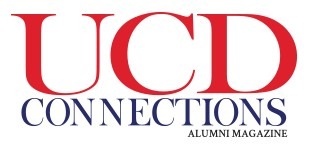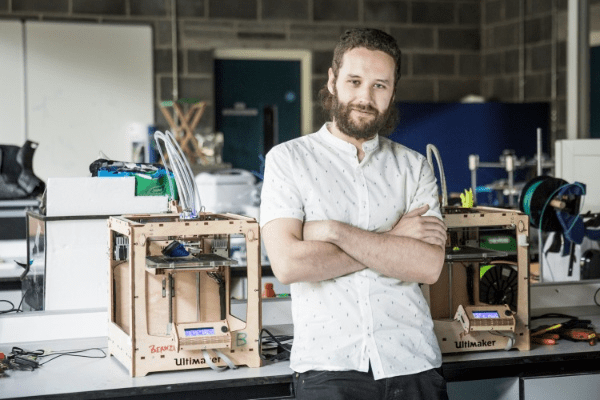Colin Keogh is an award-winning engineer who specialises in 3D printing and innovation. Colin is the CEO and Co-Founder of The Rapid Foundation – a charity project with the goal of “Putting technology in the hands of the people who need it”. He has been listed in Forbes 30 under 30. This year, Colin will complete his Engineering PhD in Creative Technology Innovation at UCD.
1. What is your fondest memory from your time at UCD?
My fondest memory was my first time using a 3D printer in UCD. I thought it was cool, complex and fiddly, but little did I know it would go on to define my career and future in so many ways. I got my taste of the potential of 3D printing while at UCD, and have embraced the technology ever since.
2. How did you end up in your current area of work?
I became a research engineer by joining a large EU-funded project as part of my master’s thesis. I started working on a number of EU projects for a few years after I graduated, giving me a love of research projects, their variety and the differences between them. This then gave me a range of experiences, allowing me to move into the technology consulting, building start-up companies and innovation fields. Working on creating new concepts and ideas is addictive, so I now work on lots of different ideas, in lots of fields around the world. I love innovation, so I spend a lot of time advising companies on their innovation strategies, practices and operations, both internally and externally.
3. Can you tell us how you started the Rapid Foundation?
Shane (my co-founder) and I decided to use the 3D printing technology that we loved so much to help people overseas to create and innovate. The power and low cost of a 3D printer can allow the user to produce nearly anything, so in our minds it was the perfect tool to allow innovation to happen anywhere. We found a group traveling to India, packed up one of our printers and sent it for 2 months, where we initially tested the idea of supporting overseas innovation. We were shocked at how interested the people on the ground were by the technology, and very surprised to find out that nobody else was providing overseas aid via technology like we were at the time. We had hit on a new concept, and things accelerated from there.
4. What do you think your career priorities will be in 10 years’ time?
Regarding career priorities, my main one is to stay passionate about what I do. I’m not one for making long-term plans, I enjoy and embrace the unknown. I will always want to enjoy what I do, find new complex problems to try and solve, as well as work with and support future innovators. We want to build the Foundation to run in numerous countries, with a wide range of collaborators leaving meaningful impact on the world.
5. What is your work/life inspiration?
My inspiration comes from solving problems. I love solving complex issues, fixing broken things and creating something new. I worked with my father growing up (he is a car mechanic) so that gave me a love of fixing things, problem-solving and technology. I do exactly that now, just with more complex problems.
6. What has been your favourite part of undertaking your PhD so far?
I love the fact that I’ve been able to travel around the world meeting some of the world’s best innovators and studying how they innovate. I got a chance to attend Forbes summits, the European Science Open Forum and a Global Innovation Exchange summit. I like to visit new places, and work with new people, so this has by far been my favourite part. I hope to keep working with all the people I’ve met after I finish my PhD and hope we can try to tackle some more complex problems.
7. What is the next “big thing” to come in technology?
AI systems will change our everyday lives in a big way. We will start to see AI assistance applied to our professional and personal lives, supporting us to perform better. They will be running our homes, ordering our groceries, making us more efficient at work and doing much of our daily logistics. You can already see AI systems on some consumer computers and mobile phones, helping correct your typing errors or take better photos.
8. What is a typical day for an Engineering Researcher?
Every day is different. One day could be focused on writing conference papers, the next could be a meeting with the other people on the team, the day after could be an overseas meeting of partners, then I could be in the workshop building prototypes or testing in the field. I spend a good bit of time exposing myself to new industries, so I try to learn from these experiences as much as possible.
9. Now that you have the Rapid Foundation off the ground, are there any other big projects in the works?
I usually have a few projects going at once. I’m continuing to grow The Rapid Foundation as we seek growth funding in 2020 and I also co-organised Start-up Week Dublin 2019 (2020 Version should be announced soon). I’m building our new inclusive design centre and I’m involved in a few start-up companies in the 3D printing, technology consultancy and social media space. I’ve set up a new innovation consultancy practice, working with organisations to develop their innovation capacity, and I am also working on a technology ethics project to help tackle the issues around technology we currently face as a society.
10. What drives you to try and solve global issues?
I think everyone should try to tackle global issues. Our world is facing significant problems, and we need to solve them, or our lives will be changed drastically. I truly believe that everyone has the ability and innovation capacity to contribute in some way to solving these problems. I see it as a goal of mine to help enable as many people as possible to utilise their innovation capacity to try and generate potential solutions to these issues.
11. How has your industry changed in the last 5 years?
Open source technology has been a big change in the engineering field over the last few years. More people than ever having the ability to access advanced manufacturing, drones, coding and other technologies has produced a whole new range of non-traditional ‘experts’. How the engineering field works with these non-traditional experts will be a vital step in the process of new technological growth in the sector. Also, the idea of a fully customised object, or parts made especially for you, to your specifications (aided by 3D printing etc) will massively impact the engineering field. The age of mass production, ‘one size fits none production’ is slowly ending.
12. How has your career impacted the way in which you see the world?
I see solutions everywhere. Little improvements to things on a day-to-day basis. It has also opened up my mind to outside influences, from other areas of expertise. I’ve gained a new appreciation of non-STEM fields, art, music, dance etc. There are significant lessons to be learned from non-technical fields, openness to new ideas and the fact that sometimes projects are started without any idea of what the end goal looks like. This openness to the unknown, and the ability to turn failure into success should be adopted more in other fields.
13. What advice would you give to someone who is just beginning their career?
Be brave and ask to join interesting projects. People always need more help, so just reach out to them and ask can you assist them. This will help you build up experience and connections. Also, if you have an idea for a project or business, just start. You can think and plan forever, then never execute, so just start. You will improve as you go along. Then when you succeed, make sure you help others to do the same. Share your support, ideas and expertise with people, to keep that flow of support going.
14. Who are the most interesting or helpful mentors or advisors that you have had?
I find that my peers in the field are some of the best mentors and advisors. People at a similar stage to you (or a bit further along) can support you through the lessons that they have learned. This support grows as the people do, meaning your peers and friends all support each other as everyone progresses.
15. What is the most useful book you’ve read?
I’m not actually a huge reader, podcasts are much more my thing. I get too easily distracted when reading for pleasure, so with podcasts I can do other things while listening to them. I love the variety of guests on the Joe Rogan Podcast, and love listening to the TED podcast series.
Twitter: https://twitter.com/colinj_keogh
Linkedin: https://www.linkedin.com/in/colin-keogh-110a0431/
My TEDx talk: “Innovation for all”: https://www.youtube.com/watch?v=weGoSQKtVAU&t=49s

